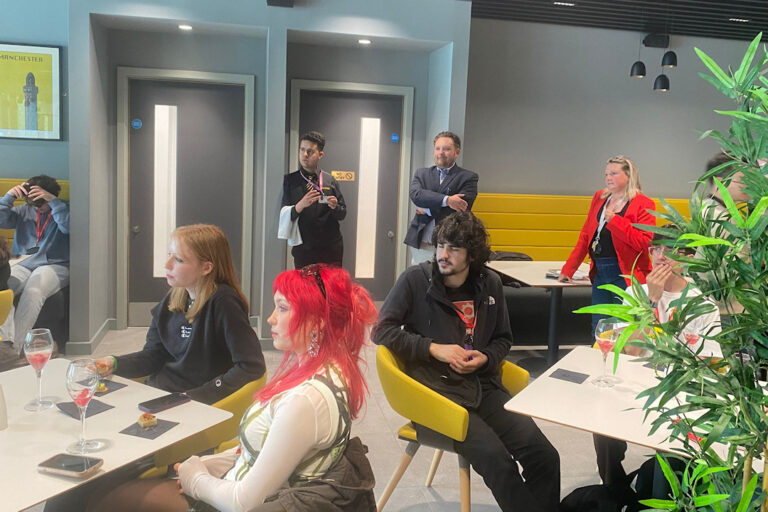Why Mentoring Makes Masterful Sense

When Mentoring Didn't Make Sense
When I was offered an opportunity to take part in the Ideas Foundation’s mentorship programme, my first thought was, “But I don’t have anything to give, that doesn't make sense". As a young person at the beginning of their career, with a severe case of imposter syndrome thrown in for good measure, how could I be of any help mentoring young professional?
This immediate response to the opportunity is the exact reason why I decided to give it a shot. Through my experiences in the education system and societal messaging, I had unwilling began to align myself with the false belief that I don’t have anything to give. How many other people out there believe this too, especially students and young professionals?

Top 10 reasons to give mentoring a go
Broadening perspectives
Mentors can provide their unique insights into the professional world, ranging from peculiar experiences to the things everyone needs to know. A mentee can provide their mentor with hip and trendy views that can challenge and change traditional systems of thought and workplace practices. Through this exchange, both mentor and mentee provide fresh viewpoints for both parties to consider, which helps everyone [4].
Boosts confidence
Mentees can build confidence through the knowledge that they are being supported and can gain assurance in the abilities and goals by receiving guidance and validation from professionals. Mentors can boost their confidence by actively using their knowledge and experience to help - you can’t put a price on the impact you can have on a young person’s career [4].
Promotes Equality
Mentoring bridges the gap between different levels of experience, which helps to promote equality in the workplace. It promotes the inclusion and diversity of different ages, abilities, and underrepresented groups to learn and grow. Through mentoring, organisations can ensure that everyone, regardless of their background, has access to the tools and resources that they need to fulfil their potential and reach their own definition of success [4].
Builds authentic relationships
Mentoring relationships aren’t as formal as initial workplace greetings, which fosters a genuine authentic relationship between the mentee and mentor [4]. These relationships are built on trust, respect, mutual support, and accountability which can uplift communities and workplace culture.
Enhances communication skills
Communicating your experiences is a skill; something that I figured out in my first few mentoring sessions. Despite the in-depth mentor training delivered by Kate Lander, mentoring is a learn through experience kind of job. As it turns out, I have a lot to say, so ensuring that my active listening, and questions suited the conversation with my mentee were a must.
As a young mentor, it was interesting to see the parallels that my mentored self and my mentee both have. As a mentee, you learn how to share your work, receive feedback, listen to guidance, and form questions. These skills are invaluable to foster growth in the workplaces, lessen miscommunications, and problem-solve [1, 2].

Encourages learning and professional devlopment
Learning can be overwhelming, as can sticking to goals, and mentoring can help both parties to find more structure and fun in continual learning. By keeping up to date on industry trends, sharing current projects and insights, and new skills, mentors and mentees can feel a self of fulfilment from independent professional development [4].
For the more competitive individuals (sorry to anyone who I have ever played pool with) mentoring provides a healthy space to compete in a healthy way that remains relevant to work. Personally, I’ve seen an uptick in my own learning, applying for courses, shadowing opportunities, and following relevant writers on Substack.
Provides guidance
Mentees often have a blinkered perspective of their own goals. Less zoomed in, the mentor can see the bigger picture and help to provide guidance to their student by helping to form achievable goals. These insights can also be helpful for the mentor, who is also too focused on aspects of their own career, reminding them to take a step back, breathe and make informed decisions for themselves [4].
Supports personal growth
Mentoring can provide mentors with a deeper sense of purpose by helping another person. This can bring deep satisfaction and personal fulfilment. Mentees can grow by receiving validation from a trusted professional, inspired and motivated by hearing stories and achievements, as well as seeing themselves achieving attainable goals [4].
Hold Accountability
I often struggled to move towards my goals set by my mentor, copywriter Marie-Anne Leonard. Laziness or procrastination? A bit of both? Probably something to explore in our next session… regardless, I was moving slow to my goals. The second I started mentoring, I found myself on track with my goals, invigorated by my mentee’s passion for her own creativity and seeing her attain achievable goals made me take my mentors advice, also supported by Ganser's findings in 1993 [3].
I now understand that Marie can see things that I couldn’t see for myself. I saw things that my mentee couldn’t see. What’s cooler, is that my mentee was benefitting from advice that Marie had given me! By two degrees of separation, yes, but one day my mentee might be a mentor and this information will be passed down. An advice chain and mentoring style that will be adapted and used through career time!

What's your 10th reason to Mentor?
References
[1] Carden, A (1990), “Mentoring and adult career development: The evolution of theory”, The Counselling Psychologist, Vol.18 No.2, pp.275-279
[2] Douglas, C.A. (1997), "Formal mentoring programs in organizations: An annotated bibliography", Centre for Creative Leadership, Greensboro.
[3] Ganser, T. (1993), “How mentors describe and categorise their ideas about mentor roles, benefits of mentoring programs and obstacles to mentoring”, paper presented at the Annual Meeting of the Association of Teacher Educators, Los Angeles
[4] Hansford, B. and Ehrich, L.C. (2006) "The principalship: how significant is mentoring?", Journal of Educational Administration 44(1):pp. 36-52.
Mentor Recruitment Scheme - Sign up today
Are you looking for ways to make a meaningful impact on the next generation of professionals? Join The Ideas Foundation for an exciting opportunity to become a mentor and support the MPA new entrant D&I employment pipelines. Our mentor training session is scheduled for 24th September from 4pm to 7pm with Kate Lander.








